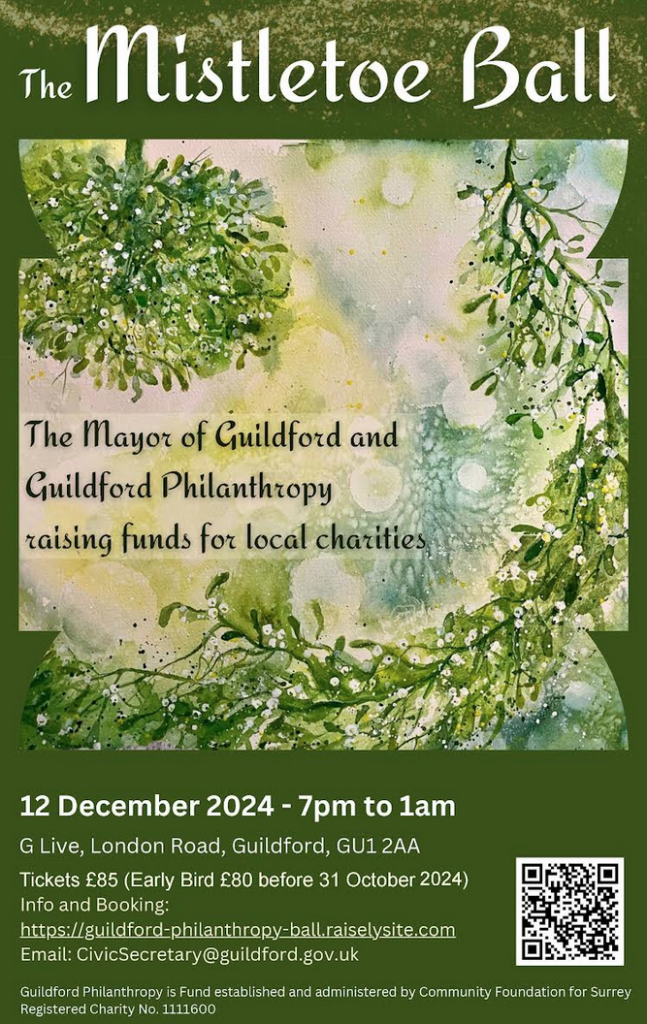 Abraham Lincoln
If given the truth, the people can be depended upon to meet any national crisis...
Abraham Lincoln
If given the truth, the people can be depended upon to meet any national crisis...
 Guildford news...
for Guildford people, brought to you by Guildford reporters - Guildford's own news service
Guildford news...
for Guildford people, brought to you by Guildford reporters - Guildford's own news service
Letter: Colonisation Was a Benefit to Many Parts of Africa
Published on: 26 Jul, 2020
Updated on: 27 Jul, 2020
In response to: Plan to ‘Decolonise’ Guildford Museum Stirs a Storm of Comment and Criticism
I think we are in danger of being made a laughing stock nationally if we implement this ill-thought-out proposal. Putting to one side the very sensible arguments from Dr Mary Alexander and Gavin Morgan, how is anyone going to interpret the action to be taken if any “colonial” links are discovered?
Britain abolished slavery in 1807 and the Royal Navy was active in stopping traders, arresting 1,600 slave vessels and releasing more than 160,000 captives, making Sierra Leone a home for them. No country did more to stop the trade.
This was years before we had colonies in Africa. When we acquired them, several decades later, we abolished slavery in them much to the annoyance of most coastal tribes who traded the slaves captured by other Africans, inland. So why are we exclusively guilty?
Not only did colonialism have the beneficial effect of abolishing this evil trade, it established peace among the endlessly warring tribes, banned guns, developed trade and gave local people with diverse tongues a passport to the modern world with the English language. They also had a colonial administration which was almost entirely honest and competent.
Colonialism for most Africans was a force for good and this is recognised by every former British colony in Africa joining the Commonwealth, even former French and Portuguese countries have joined. Sadly, in some countries including Nigeria and Zimbabwe, tribal conflict has re-emerged since independence and there are signs that could rear its head again in South Africa.
I lived for six years in Africa, two in independent Ethiopia, the poorest country by far where legal slavery persisted till 1934. My Ethiopian friends always complained: “We never had the advantage of British colonial administration.”
As a one-time adviser on Africa development to the British government, I have worked in, or visited, all the former colonies there and never encountered antagonism to our role in their development. Indeed, for many of the least well-off, it was a golden age of peace and justice Professor Lalvani in his book India, a story of British Enterprise asks a very pertinent question: “What would have happened if the Brits had stayed at home?” One might also wonder, “How would Africa have developed?”
Responses to Letter: Colonisation Was a Benefit to Many Parts of Africa
Leave a Comment Cancel replyPlease see our comments policy. All comments are moderated and may take time to appear.

"Found any?" - "Nope, it all looks green to me!" (See Opinion: The Future is Congested, the Future is Grey)
www.abbotshospital.org/news/">





Recent Articles
- Latest Evidence in Sara Sharif Trial
- Ash’s New Road Bridge Is Named – and November 23rd Is Opening Day
- Class A in Underwear Leads to Jail Sentence
- Historical Almshouse Charity Celebrates Guildford in Bloom Victory
- Notice: Shalford Renewable Showcase – November 16
- Firework Fiesta: Guildford Lions Club Announces Extra Attractions
- Come and Meet the Flower Fairies at Watts Gallery
- Updated: Royal Mail Public Counter in Woodbridge Meadows to Close, Says Staff Member
- Letter: New Developments Should Benefit Local People
- Open Letter to Jeremy Hunt, MP: Ash’s Healthcare Concerns


Recent Comments
- Paul Spooner on Ash’s New Road Bridge Is Named – and November 23rd Is Opening Day
- Harry Eve on Opinion: The Future is Congested, the Future is Grey
- Nigel Keane on Letter: New Developments Should Benefit Local People
- Nathan Cassidy on Updated: Royal Mail Public Counter in Woodbridge Meadows to Close, Says Staff Member
- T Saunders on Opinion: The Future is Congested, the Future is Grey
- Jim Allen on Updated: Royal Mail Public Counter in Woodbridge Meadows to Close, Says Staff Member
Search in Site
Media Gallery
Dragon Interview: Local Artist Leaves Her Mark At One of England’s Most Historic Buildings
January 21, 2023 / No Comment / Read MoreDragon Interview: Lib Dem Planning Chair: ‘Current Policy Doesn’t Work for Local People’
January 19, 2023 / No Comment / Read MoreA3 Tunnel in Guildford ‘Necessary’ for New Homes, Says Guildford’s MP
January 10, 2023 / No Comment / Read More‘Madness’ for London Road Scheme to Go Ahead Against ‘Huge Opposition’, Says SCC Leader
January 6, 2023 / No Comment / Read MoreCouncillor’s Son Starts Campaign for More Consultation on North Street Plan
December 30, 2022 / No Comment / Read MoreCounty Council Climbs Down Over London Road Works – Further ‘Engagement’ Period Announced
December 14, 2022 / No Comment / Read MoreDragon Interview: GBC Reaction to the Government’s Expected Decision to Relax Housing Targets
December 7, 2022 / No Comment / Read MoreHow Can Our Town Centre Businesses Recover? Watch the Shop Front Debate
May 18, 2020 / No Comment / Read More
This website is published by The Guildford Dragon NEWS
Contact: Martin Giles mgilesdragon@gmail.com
Log in- Posts - Add New - Powered by WordPress - Designed by Gabfire Themes








George Potter
July 26, 2020 at 1:33 pm
I think the only advice I can offer to Mr Bridger is that he should pick up a history book if he thinks that liberating 160,000 captives makes up for two million who died on the middle crossing before that, or the millions more who were worked to death on plantations (on sugar plantations at one point the life expectancy was just seven years), and if he thinks that British colonial administrations were honest, free from corruption and free from cruelty.
If this is kind of historical illiteracy is commonplace amongst former government advisors on development in Africa then I have to say I’m really glad that Mr Bridger is retired.
George Potter is a Lib Dem borough councillor for Burpham
Jules Cranwell
July 26, 2020 at 5:30 pm
Before insulting Alderman Bridger, perhaps Cllr Potter should have done his research. If he had he would know that Mr Bridger is a highly respected servant of the borough, who has many, many years of civic duty to his name. Mr Potter is most unlikely to reach these heights, given his propensity to shoot from the hip. He seems as momentously ill-informed as his colleague, James Steel.
Does the Lib Dem leadership have no control over, or interest in, these party colleagues, or their ill-advised pronouncements?
As my grandmother used to opine: “It is not for you to teach me how to suck eggs, young whippersnapper”.
Ben Paton
July 26, 2020 at 5:27 pm
More than a little simplistic to blame all of the world’s troubles on colonialism, as Martin Meredith’s remarkable history reveals: https://www.amazon.com/State-Africa-Continent-Independence-Meredith/dp/0857203886
No one believes that British colonial administrations were wholly, “honest, free from corruption and free from cruelty”. And that astonishing standard would certainly not be met by Guildford Borough Council, let alone national governments past or present.
There is plenty wrong with the world. But making historical scapegoats solves little or nothing.